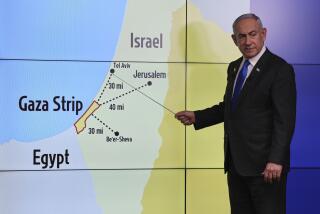U.S. Advisor Affirms Bush Support of W. Bank Barrier
- Share via
MELVILLE, N.Y. — In a preview of U.S. expectations ahead of a new round of Mideast diplomacy, President Bush’s top strategist on the conflict has told private gatherings of scholars and Jewish leaders that settlements walled off from Israel by the country’s controversial barrier in the West Bank will have to be dismantled.
The comments by Elliot Abrams, a senior director at the National Security Council, signaled to tens of thousands of settlers that they are on increasingly untenable ground.
But by using the barrier as a point of reference, Abrams indicated that the U.S. does not object to Israel’s continuing construction of the barrier, which puts the most populous Jewish settlements in the West Bank on the Israeli side.
Israel has acknowledged it will ultimately have to relinquish parts of the West Bank -- home to approximately 230,000 settlers and 2.3 million Palestinians. But how much it will have to give up is the subject of charged debate.
During closed discussions late last month in Washington, Abrams affirmed Bush’s recent policy shift to supporting Israel’s retention of some settlements on land captured in the 1967 Middle East War and rejecting Palestinian claims to a right to return to homes in Israel.
Abrams went further by explicitly addressing the fate of settlers living beyond the barrier, according to Israeli media accounts and people who attended the sessions. Israel says the barrier is being erected to keep out Palestinian suicide bombers, but it has been condemned in many quarters of the international community as a land grab that violates Palestinians’ rights.
Depending on the ultimate route of the walls and fencing, 50,000 to 70,000 settlers could be left outside the barrier in about 70 settlements, estimate experts who have studied various scenarios. There are Israeli proposals to sustain many of these communities through a network of private roads.
Abrams’ statements suggest U.S. opposition to that plan and an emerging belief in the Bush administration that the barrier should be a future political border -- an idea rejected by Palestinians and some Israelis as imposing boundaries without negotiation.
Abrams declined to be interviewed.
A senior administration official did not dispute the content of the remarks but said that they do not represent U.S. policy and that the president’s chief of Middle East affairs “was merely making an observation about the situation on the ground.”
More to Read
Get the L.A. Times Politics newsletter
Deeply reported insights into legislation, politics and policy from Sacramento, Washington and beyond. In your inbox three times per week.
You may occasionally receive promotional content from the Los Angeles Times.










